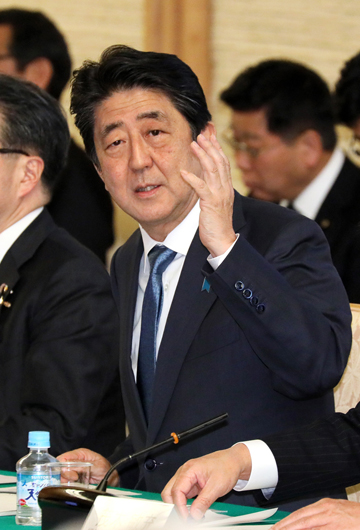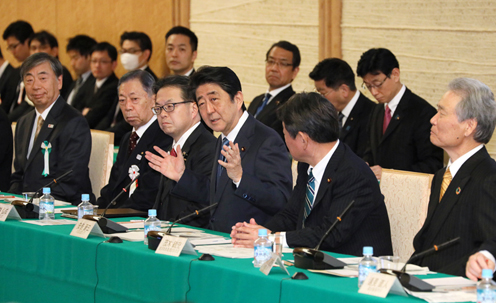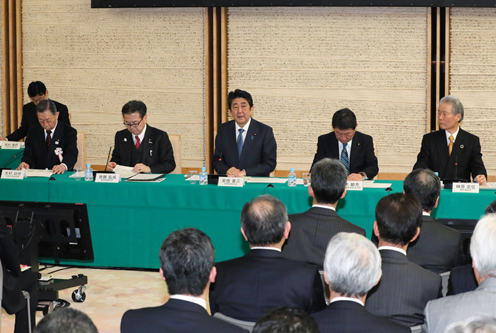Home > News > The Prime Minister in Action > February 2018 > Council on the Promotion of the National Movement to Improve Productivity
The Prime Minister in Action
Council on the Promotion of the National Movement to Improve Productivity
February 15, 2018
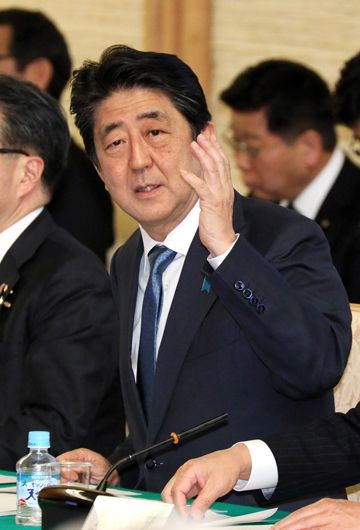
Photograph of the Prime Minister making a statement (1)
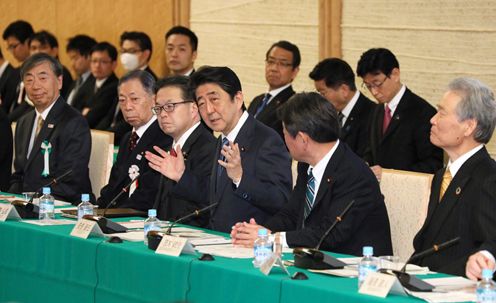
Photograph of the Prime Minister making a statement (2)
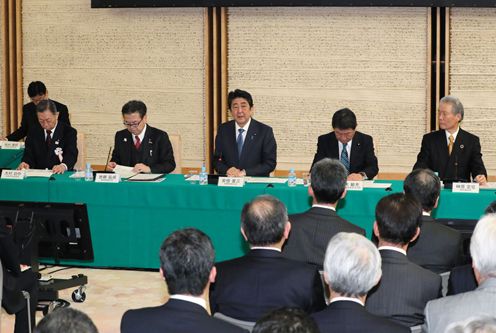
Photograph of the Prime Minister making a statement (3)
[Provisional Translation]
On February 15, 2018, Prime Minister Shinzo Abe held a meeting of the Council on the Promotion of the National Movement to Improve Productivity at the Prime Minister’s Office.
At the meeting, reports were given on initiatives of the business groups from various sectors.
The Prime Minister said in his opening address,
“Today, we have asked the representatives of business groups as well as the top management who are kept busy with the day-to-day operations of their companies to gather here from every corner of Japan with the aim of improving productivity through all-Japan efforts.
Thanks to five years of Abenomics, Japan’s economy has achieved positive growth for eight consecutive quarters for the first time in 28 years. The economy’s positive cycle has begun to steadily set into motion due to four straight years of rising wages, and we are definitely moving along the path to the exit from deflation with the achievement of powerful economic growth led by private demand.
As a result, the supply-demand gap has been closed and is currently positive. Small- and medium sized enterprises (SMEs) and small businesses are faced with serious personnel shortages.
The greatest issues facing the Japanese economy today are eliminating labor shortages, improving productivity, and increasing the potential growth rate. We will implement various measures to resolve labor shortages from various angles, but they will be fundamentally rooted in improving productivity. The key to improving productivity is human resources development. I believe firmly advancing human resources development will increase the quality of individual personnel and contribute to increasing the potential growth rate.
We will confront the national challenge of a rapidly progressing declining birthrate and aging population to create a society where everyone naturally strives to fulfill their dreams.
The Abe administration will work to ensure that the wave of economic recovery reaches every corner of Japan by improving productivity. I ask for your cooperation in this regard.”
In addition, based on the day’s reports, the Prime Minister said in his concluding remarks,
“I would like to express my deep gratitude to the representatives of business groups and top management in attendance today, who have reported on the status of your initiatives to increase productivity, for coming from across Japan despite your busy schedules.
I had an opportunity to hear firsthand about the steady efforts you have been making toward improving productivity since setting up this Council last year, in the restaurant, accommodation, road freight, nursing care, and retail sectors. I feel very reassured by your presentations.
I also sensed strong ambition from those joining us for the first time from the construction, healthcare, environmental health, learning support, and agricultural sectors with regard to the activities that will be implemented.
As prime minister, I attend various meetings; I can say participating in this council meeting makes me feel very excited. This is not to say that other meetings do not excite me. While other meetings can also be exciting, this meeting truly makes me excited. This is because, as was the case today, presentations are given on the outcomes of the initiatives to date, showing us that concrete and therefore easy-to-understand initiatives are carried out and deliver results. Furthermore, we heard the good news that the participants will take advantage of these results to increase employee bonuses. Indeed visible results are being achieved. It is like watching the television broadcast of the PyeongChang Olympics and seeing gold, silver, and bronze medals being handed out one after another. While Japan has yet to have a gold medalist in the Games, I have high expectations for this weekend. In this manner, I hope that we will continue to see many more new medalists.
I gather that many of the industries represented today are some of the most closely intertwined with the lives of the people. These industries have spread to every corner of Japan. I believe there are opportunities that can be seized in which if you succeed in improving productivity, all areas of Japan will achieve steady economic growth without a doubt.
In Japan, the population is now declining. Meanwhile, the economy is performing well and the ratio of active job openings to applicants is at its highest level in 43 years. Also, the fourth industrial revolution is advancing, including IoT, AI, and robots. In other words, all the conditions are present for a greater revolution in productivity. It means if we do not achieve productivity improvements now, there may not be a future for Japan or all of you.
I look forward to working together with you on improving productivity as a national movement to jointly help pave the way for your future, your tomorrow, and the tomorrow of Japan. Thank you very much.”

